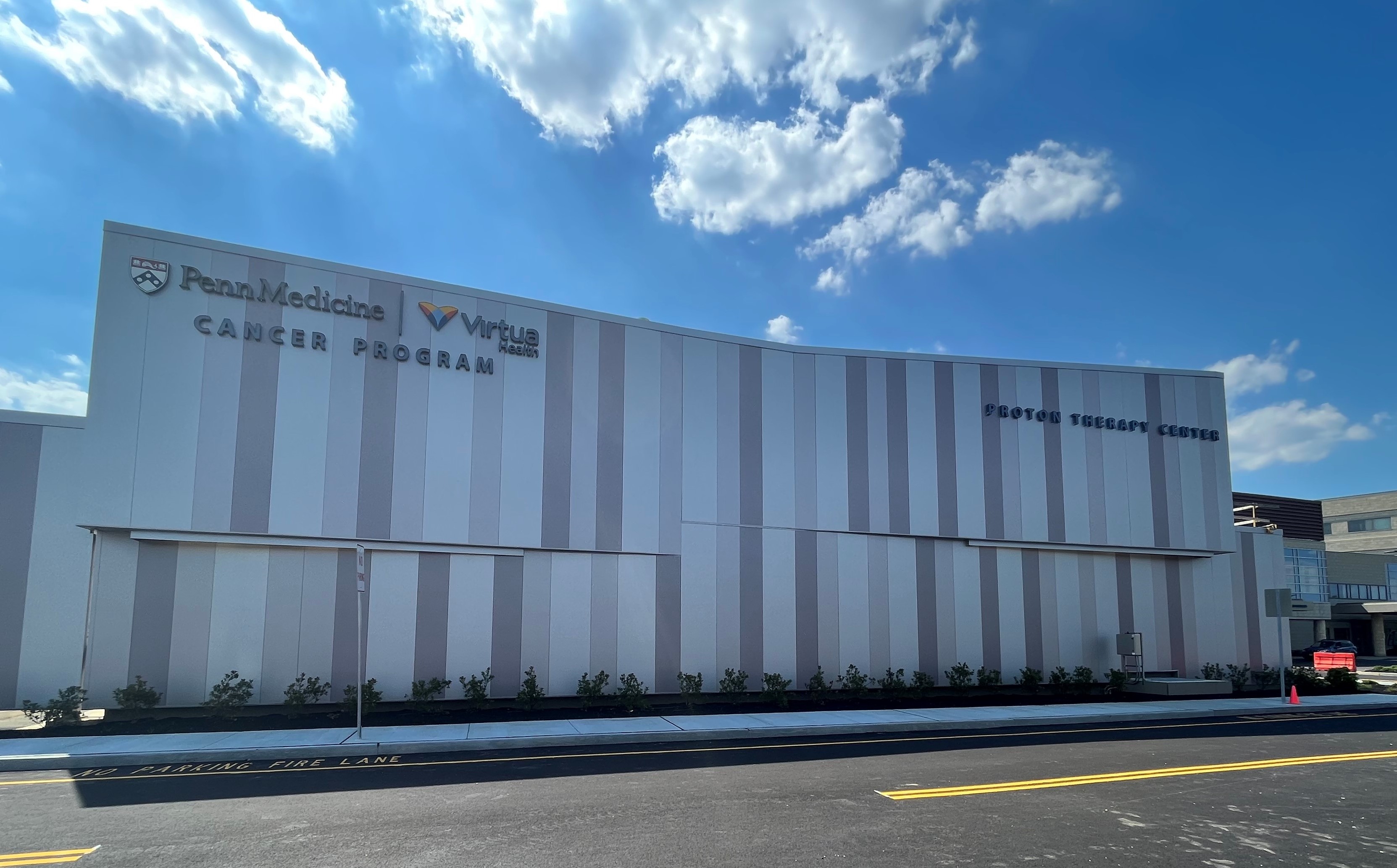Proton Therapy
Proton therapy is the most advanced form of radiation treatment. It targets cancer while sparing healthy tissue and organs.

Proton therapy precisely targets cancer, offering patients new hope for recovery, survival, and improved quality of life. The Penn Medicine | Virtua Health Proton Therapy Center brings this advanced treatment close to home in South Jersey.
What is Proton Therapy Treatment?
Proton therapy is a painless, noninvasive type of radiation therapy used to treat cancer. The doctor uses a controlled high-energy proton beam to target your tumor during treatment. This beam has pinpoint accuracy and is designed to conform to your tumor’s specific shape and size.
This treatment precisely destroys cancer cells while significantly decreasing damage to healthy tissues and organs nearby.
Am I a Candidate for Proton Therapy?
Proton therapy is used to treat patients with cancerous tumors located near highly sensitive areas or with tumors that can’t completely be surgically removed.
You may be a candidate for proton therapy if you have one of the following cancer types:
- Brain
- Breast
- Gastrointestinal
- Gynecologic
- Head and neck
- Kidney
- Liver
- Lung
- Lymphoma
- Mesothelioma
- Prostate
- Sarcomas
- Spine
- Recurrent cancer previously treated with radiation therapy
Proton Therapy Specialists
The Penn Medicine | Virtua Health proton therapy team is led by board-certified and highly experienced radiation oncologists.
Proton Therapy Treatment at Virtua
Your cancer team provides compassionate, coordinated care throughout the evaluation and treatment process, so you can focus on getting and staying well.
Your treatment plan may include proton therapy, traditional photon radiation therapy, or a combination of treatments. If proton therapy is recommended, you’ll be scheduled for planning sessions to help your team develop your individualized cancer treatment plan.
Proton therapy treatment plans include the following:
Evaluation: Your radiation oncologist reviews your medical records and diagnostic images (such as an MRI and CT scans), performs a physical exam, and recommends additional tests if needed. The doctor determines what type of radiation is best for you and discusses the risks and benefits, including potential side effects and how to manage them.
Simulation: Your first session is a simulation, which is a practice run without radiation. We use CT imaging scans to map the exact area of your body being treated. The team then positions you for treatment.
If needed, we use immobilization devices to ensure you’re in that exact position for each treatment. We also may put small marks on your skin to identify the treatment area.
Treatment: Your treatment planning takes approximately two weeks after CT simulation, and then your proton therapy begins. Treatments are typically delivered daily, Monday through Friday, over several weeks.
Depending on the area being treated, proton therapy treatments typically take about 15 to 20 minutes. You also meet with your doctor and nurse weekly to assess and manage any side effects.
After treatment ends: On your last day of treatment, we invite you to ring the bell to celebrate your achievement. Your radiation oncologist meets with you to review your survivorship care plan. This plan includes recommendations for follow-up care and resources to help you maintain your health.
Benefits of Proton Therapy
The benefits of proton therapy treatment include the following:
- Precision: Proton therapy precisely targets tumors, significantly reducing exposure to nearby healthy tissues.
- Power: This precision allows radiation oncologists to treat tumors with higher doses of radiation than other methods.
- Painless: Proton therapy treatments are noninvasive and painless.
- Milder side effects: Compared with other therapies, proton therapy may produce fewer side effects, so you feel better and recover faster from treatment.
- Ability to treat recurrent cancer: Proton therapy is an option to treat recurrent cancers previously treated with other radiation therapies.
- Can be combined with other cancer treatments: Depending on your condition and cancer type, proton therapy can be used with chemotherapy, immunotherapy, or surgery.

Penn Medicine | Virtua Health Proton Therapy Center
The Virtua Difference for Proton Therapy
Internationally recognized cancer expertise
Penn Medicine is a pioneer in the field of proton therapy and runs the world's largest, most advanced facility. Penn has gained an international reputation by training more than 70% of clinicians using proton therapy globally. Their decade-plus of experience treating more than 8,000 patients with proton therapy is used to develop treatment plans for patients in South Jersey.
Internationally recognized cancer expertise
Penn Medicine is a pioneer in the field of proton therapy and runs the world's largest, most advanced facility. Penn has gained an international reputation by training more than 70% of clinicians using proton therapy globally. Their decade-plus of experience treating more than 8,000 patients with proton therapy is used to develop treatment plans for patients in South Jersey.
An integrated team focused on you
The diagnosis and treatment of cancer requires a coordinated team of experts to collaborate on all aspects of patient care. The Penn Medicine | Virtua Health Cancer Program team includes Penn Medicine and Virtua physicians working together in New Jersey to provide individualized, state-of-the-art treatment and personalized care. Your case is reviewed by a team of oncology doctors, nurses, and other specialists. Working together, they develop a comprehensive plan to treat YOU, not just your cancer.
An integrated team focused on you
The diagnosis and treatment of cancer requires a coordinated team of experts to collaborate on all aspects of patient care. The Penn Medicine | Virtua Health Cancer Program team includes Penn Medicine and Virtua physicians working together in New Jersey to provide individualized, state-of-the-art treatment and personalized care. Your case is reviewed by a team of oncology doctors, nurses, and other specialists. Working together, they develop a comprehensive plan to treat YOU, not just your cancer.
Care for the whole person
Cancer affects all aspects of your life, and we’re here to address all your questions and concerns. Beyond your medical or surgical treatment plan, you also can access cancer support resources such as counseling, pain management, and sexual wellness services. This holistic approach led to the Penn Medicine | Virtua Health Cancer Program’s accreditation by the American College of Surgeons Commission on Cancer.
Care for the whole person
Cancer affects all aspects of your life, and we’re here to address all your questions and concerns. Beyond your medical or surgical treatment plan, you also can access cancer support resources such as counseling, pain management, and sexual wellness services. This holistic approach led to the Penn Medicine | Virtua Health Cancer Program’s accreditation by the American College of Surgeons Commission on Cancer.
Cancer clinical trials
Virtua’s partnership with Penn Medicine gives you access to national clinical trials and other research. When you participate in a clinical trial, you may have access to a promising new therapy before it’s widely available.
Cancer clinical trials
Virtua’s partnership with Penn Medicine gives you access to national clinical trials and other research. When you participate in a clinical trial, you may have access to a promising new therapy before it’s widely available.
Nurse navigation
Once you are scheduled for a consultation, our cancer nurse navigators assist with all of the treatment details and your day-to-day needs, ensuring a positive and seamless experience.
Nurse navigation
Once you are scheduled for a consultation, our cancer nurse navigators assist with all of the treatment details and your day-to-day needs, ensuring a positive and seamless experience.
Proton Therapy Quick links
How can we help you?
Request a Proton Therapy Consultation
Proton therapy precisely targets cancer, offering new hope for recovery and an improved quality of life. Click the link above or call 856-247-7334 to learn more about this advanced form of radiation treatment and whether it’s right for you.
Comprehensive Cancer Care
Penn Medicine | Virtua Health Cancer Program specialists work side by side to provide you advanced care. We’re here for you, every step of the way.
